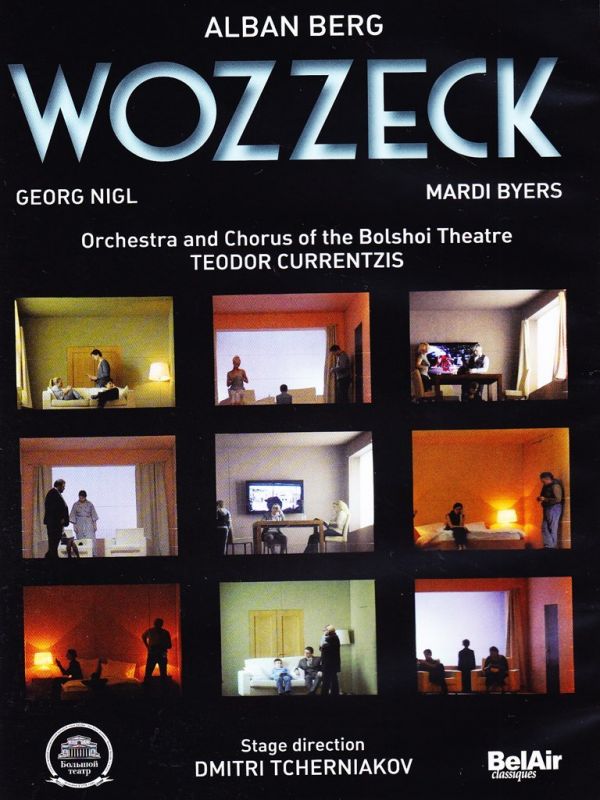BERG Wozzeck
First Russian Wozzeck since 1927 on DVD from the Bolshoi
View record and artist detailsRecord and Artist Details
Composer or Director: Alban Berg
Genre:
Opera
Label: Bel Air Classiques
Magazine Review Date: 12/2012
Media Format: Digital Versatile Disc
Media Runtime: 135
Mastering:
Stereo
DDD
Catalogue Number: BAC068

Tracks:
| Composition | Artist Credit |
|---|---|
| Wozzeck |
Alban Berg, Composer
Alban Berg, Composer Bolshoi Theatre Chorus Bolshoi Theatre Orchestra Georg Nigl, Wozzeck, Tenor Leonid Vilensky, Idiot, Tenor Maksim Paster, Captain, Tenor Mardi Byers, Marie, Soprano Nikolai Kazansky, Apprentice II, Baritone Piotr Migunov, Doctor, Bass Roman Muravitsky, Drum Major, Tenor Roman Shulakov, Andres, Tenor Teodor Currentzis, Conductor Valery Gilmanov, Apprentice I, Bass Xenia Vyaznikova, Margret, Contralto (Female alto) |
Author: Mike Ashman
Tcherniakov (who also designs set and costumes) places the action in a Rubik’s cube of nine contemporary living rooms in a city high-rise (Marie’s appartment is just one of these), in a stage-width modern bar, or (for Wozzeck hunting his murder weapon) in complete darkness. Sometimes the other eight rooms are occupied by families (it’s where the children sing from to tell Marie’s child about her death), sometimes – in moments of chamber-like anguish for Wozzeck later in the opera – by instrumental soloists, especially the cello, from the orchestra. Black mobile curtain screens (on which scene numbers, stage directions and surtitles are projected, Brechtian style) select which spaces we watch. There is no attempt at naturalistic depiction of a world outside (the director explains this in a stylishly brutalist note that the fainter-hearted should read after viewing). The effect is to throw all the focus on to Wozzeck’s mental state and observations of his often callous and mad fellow humans – Wozzeck as saint (the large number of Bible quotations in the text make a huge sense here), prophet or only sane human being.
Sound and vision (video direction by Andy Sommer) are wholly at one with the production. There are (well-integrated) freaky moments – the killing of Marie definitely one – but, unless you cannot cope with the loss of an early-19th-century period setting, this production will furnish the clearest possible exposé of the Berg/Büchner drama. Among present visual rivals only the Chéreau/Barenboim is worth the detour for the staging.
Discover the world's largest classical music catalogue with Presto Music.

Gramophone Digital Club
- Digital Edition
- Digital Archive
- Reviews Database
- Full website access
From £8.75 / month
Subscribe
Gramophone Full Club
- Print Edition
- Digital Edition
- Digital Archive
- Reviews Database
- Full website access
From £11.00 / month
Subscribe
If you are a library, university or other organisation that would be interested in an institutional subscription to Gramophone please click here for further information.




